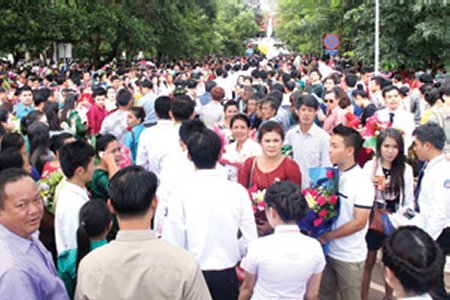University Graduates Face Uphill Battle In Job Market
While the latest batch of National University of Laos graduates celebrate their achievement, they are faced with the sobering reality of low prospects in immediate employment.
The number of new graduates this year stands at 8,162, adding to existing graduates who have already joined the job market.
There is a growing anxiety among final year university students about their job prospects, with some estimates putting the number of new graduates gaining immediate employment at as low as 20 percent, an expert said.
However, new graduates who received scholarships from the government have no need to seek jobs after finishing university because they will be put to work to develop their communities. Those who have not been awarded scholarships, on the other hand, need to look for jobs by themselves.
Meanwhile, graduates who did an agriculture degree will also be given jobs during their studies at university, according to the university’s Academic Affairs Director, Assoc. Prof. Dr Khamphong Nammavongmixay.
The main problem for the university’s new graduates is that they want to apply for better positions with higher salaries rather than work in lower skilled positions that don’t require tertiary qualifications and are low paid.
Graduates have been seen to be working with their families’ businesses for a few years during their job hunt.
As the public is aware, Laos is suffering from a shortage of vocational expertise, notably technicians.
Many companies and projects in Laos hire skilled labourers from other countries as part of the drive to transform the country into an industrial state.
However, Laos needs to expand its nationwide skills base as domestic and foreign investment increases, particularly in the human resources and technology sectors, to address the issue.
The Ministry of Education and Sports is set to continue developing and integrating vocational training methods into the national education system, with the aim of expanding and improving the skilled workforce to meet the needs of both domestic and foreign labour markets.
Large-scale projects in the hydropower and mining sectors are being implemented and there has been significant growth in small and medium-sized enterprises and private businesses.
Director General of the National Economic Research Institute, Dr Leeber Leebouapao, told Vientiane Times recently that workers in Laos had not matched market needs and there was still a shortage of highly-skilled personnel.
He expressed concerns that jobs requiring high skills would be taken up by foreign nationals in 2015, when the Asean Economic Community comes into being. This is certain to happen if Laos fails to properly prepare and train its workforce, he warned.
Dr Leeber suggested the government take urgent action and work closely with businesses and private education institutes to identify labour demands in order to properly train the workforce based on market demand.
Source: Vientiane Times

